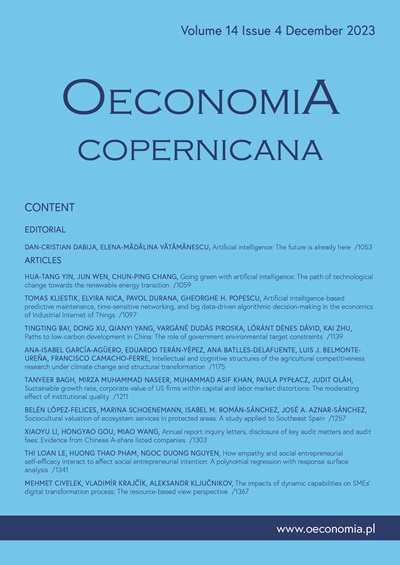A grouping of the Sustainable Development Goals (SDGs) and their influence on business results: An analysis for Spanish companies
IF 10.8
1区 经济学
Q1 ECONOMICS
引用次数: 0
Abstract
Research background: In 2015, the United Nations (UN) set the 2030 Agenda for Sustainable Development and established 17 Sustainable Development Goals (SDGs) containing the social, economic, and environmental pillars of sustainable development. These focus on governments, society, non-profit organisations, and the private sector. This last pillar plays a key role in the pursuit of these goals, but there remains a lack of knowledge regarding how companies achieve the SDGs. Purpose of the article: Some authors have analysed the effect of companies' adoption of the SDGs on their business performance. However, there is a gap in the analysis of this influence when considering the groups of SDGs. This study examines the level of commitment of a sample of Spanish companies with a grouping of the SDGs and their effects on business results. Methods: We obtained information on companies from the UNGC and developed a panel regression. Findings & value added: We concluded that all the SDGs do not have the same effect on companies that incorporate them into their activities. Although it is possible to make progress in all the SDGs, complementarities and trade-offs influence companies' results. The results obtained in this study incorporate new ideas into this issue and provide a new vision of how companies should incorporate sustainability into their businesses. It is not a question of achieving as many sustainable development goals as possible, but rather of focusing on those that can contribute the most to improving business performance. The clustering of the SDGs that we have undertaken and their subsequent analysis facilitates this work.一组可持续发展目标(sdg)及其对业务结果的影响:对西班牙公司的分析
研究背景:2015年,联合国制定了2030年可持续发展议程,并确立了17个可持续发展目标(sdg),其中包含可持续发展的社会、经济和环境支柱。这些重点是政府、社会、非营利组织和私营部门。最后一个支柱在实现这些目标方面发挥着关键作用,但人们对企业如何实现可持续发展目标仍然缺乏了解。文章目的:一些作者分析了公司采用可持续发展目标对其业务绩效的影响。然而,在考虑可持续发展目标组时,对这种影响的分析存在差距。本研究考察了一组西班牙公司的可持续发展目标的承诺水平及其对业务结果的影响。方法:我们从UNGC中获得公司信息,并进行面板回归。研究结果和附加价值:我们的结论是,所有可持续发展目标对将其纳入其活动的公司的影响并不相同。虽然有可能在所有可持续发展目标中取得进展,但互补性和权衡会影响公司的结果。本研究的结果为这个问题提供了新的思路,并为公司如何将可持续发展纳入其业务提供了新的视角。这不是实现尽可能多的可持续发展目标的问题,而是关注那些能够对改善业务绩效贡献最大的目标的问题。我们已开展的可持续发展目标的分类及其后续分析有助于这项工作。
本文章由计算机程序翻译,如有差异,请以英文原文为准。
求助全文
约1分钟内获得全文
求助全文
来源期刊

Oeconomia Copernicana
ECONOMICS-
CiteScore
13.70
自引率
5.90%
发文量
26
审稿时长
24 weeks
期刊介绍:
The Oeconomia Copernicana is an academic quarterly journal aimed at academicians, economic policymakers, and students studying finance, accounting, management, and economics. It publishes academic articles on contemporary issues in economics, finance, banking, accounting, and management from various research perspectives. The journal's mission is to publish advanced theoretical and empirical research that contributes to the development of these disciplines and has practical relevance. The journal encourages the use of various research methods, including falsification of conventional understanding, theory building through inductive or qualitative research, first empirical testing of theories, meta-analysis with theoretical implications, constructive replication, and a combination of qualitative, quantitative, field, laboratory, and meta-analytic approaches. While the journal prioritizes comprehensive manuscripts that include methodological-based theoretical and empirical research with implications for policymaking, it also welcomes submissions focused solely on theory or methodology.
 求助内容:
求助内容: 应助结果提醒方式:
应助结果提醒方式:


